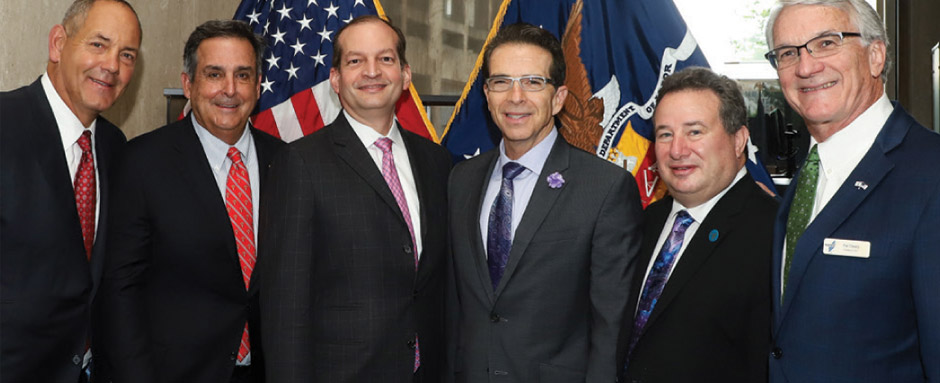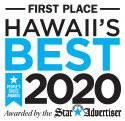Simply Business: Unpacking the American Rescue Plan
Barron Guss, president and CEO of ALTRES, sat down in late March with T. Mark Spain, District Director for the U.S. Small Business Administration’s Hawaii-Pacific Islands office and Arnold Martines, Executive Vice President & Chief Banking Officer of Central Pacific Bank to discuss what the $1.9 trillion American Rescue Plan means for Hawaii businesses.
Listen to the podcast here:
Spain clarified details of the COVID relief funds available for Hawaii businesses and how to access EIDL grants, SVOG grants, and restaurant revitalization funds. Key updates and a portion of the Q&A are included in the article below. The Q&A was edited for length and clarity.
To see the rest of this interview click here: Simply Business Part 2: PPP loans and forgiveness
What’s in the American Rescue Plan for businesses? – 4:15
$7.25 billion in Paycheck Protection Program funding.
$15 billion in Economic Injury Disaster Loan funding
$25 billion for the Restaurant Revitalization Fund
$1.25 billion additional funds for shuttered venue operators grants
Employee Retention Credit available through 12/31/2021
$86 billion to support failing multi-employer pension programs
$10.4 billion to support agriculture and other forms of assistance aimed at acquiring land
Economic Injury Disaster Loan Grant updates – 5:10
- Entities that received less than $10,000 in EIDL funding through the CARES Act passed in March 2020 will be invited to receive the difference between their EIDL amount and $10,000. There is no application, eligible organizations will be contacted by the SBA Office of Disaster Assistance. Only businesses located in a low-income census tract qualify.
- $5,000 grants will be available to entities that have suffered an economic loss greater than 50 percent and have 10 or fewer employees.
Economic Injury Disaster Loan updates – 6:30
- The loan maximum will be increased above $150,000. The exact increase had not yet been released as of this interview.
Shuttered Venue Operators Grant updates – 7:20
- Operators can now apply for both a PPP loan and a shuttered venue grant.
- The SBA is expected to open a portal for SVOG applications in early April.
- Venues can use PPP loan funds for expenses until the SVOG portal is open. PPP funds used will be reduced from the SVOG amount.
Restaurant Revitalization Fund – 16:25
- Rules will likely be published the second week of April.
- Restaurant owners likely will not be required to register with SAM.gov, like SVOG applications must.
- Bars and restaurants with social distancing requirements will have access to the funds. Establishments that cater to close-proximity experiences, like karaoke bars, may be more restricted.
Q&A with T. Mark Spain of the SBA
Barron Guss: There are shuttered venues — they could be concert halls, stadiums, or public areas — that do have restaurants in them. How do grants work in that situation?
T. Mark Spain: One owner cannot apply for a shuttered venue grant and a restaurant grant; they are mutually exclusive. There can be some that are co-located, but they’re owned by different owners. The assumption is it would be a different EIN or operator.
Guss: How is a shuttered venue grant different from a PPP?
Spain: The PPP is 60 percent payroll specific and 40 percent for supply chain expenses or payroll costs like insurance and rent. An operating grant is wide open for working capital expenditures and has very few limitations.
Guss: Will there be third-party agents people in Hawaii can walk in to for help with grant funding?
Spain: We are teaming up with the Minority Business Development Agency Center Honolulu located at the University of Hawaii at Manoa. They’re working to put together ongoing workshops that will happen in the month of April as rules and regulations are published.
Guss: I have a few questions from folks in our constituent base. From Lauren Zirbel, executive director of the Hawaii Food Industry Association, ‘Do you know if Hawaii has plans to, or is exploring plans to, use money toward premium pay?’
Spain: The federal government can provide money to the state and local governments for discretionary spending as they see fit. The federal government hasn’t specified or planned funds for premium pay, but that does not mean the state and county governments may not have activities that will be using premium pay. Premium pay is devised as two steps, either time and a half or double time based on the number of hours it’s being used for in a given workweek.
Guss: From Nalani Kathleen Kaauwai Brun, director of the office of economic development, Kauai. ‘Can the SBA provide more details on restaurant grant eligibility criteria?’ For example, are food trucks, bars, and caterers eligible?
Spain: It’s subject to interpretation later, but the answer now is yes for food trucks. Yes for bars if they serve food. I can give a hybrid example for a well-known caterer in Honolulu that also has a restaurant open four hours each day; they will qualify.
Guss: Also from Brun, ‘Do grant funds need to be spent by December 31, 2021?’
Spain: To be determined, likely published in early April.
Guss: I’ve also heard about this next question from Brun. ‘I’ve heard there will be a priority period for small businesses that are women-owned, veteran-owned, or economically disadvantaged. Can you tell us more about this?’
Spain: Yes, they do have preferences in contracting, which is the biggest arena that I can give as a tangible example. They have ability to enter sole-sourced contracts.
Be sure to watch the entire interview (above) to get all the details.
Like us on Facebook and LinkedIn to get the latest on the American Rescue Plan and other issues affecting the local business community.
Have a question for our HR experts? Contact simplicityHR to learn more about the advantages of having our team of professionals on your side as you navigate the American Rescue Plan Act.
About Barron Guss
 Barron is President and CEO of simplicityHR by ALTRES, Hawaii’s leader in human resources outsourcing. Barron and ALTRES are credited with not only establishing the HR outsourcing industry in Hawaii, but also pioneering it nationally. His business has grown into a family of companies that include ALTRES, simplicityHR, HR Symphony, Real Jobs Hawaii, Home Care by ALTRES and four specialized staffing divisions (ALTRES Office, ALTRES Technical, ALTRES Industrial and ALTRES Medical) serving the state of Hawaii with office locations across Oahu, Maui, and Hawaii Island.
Barron is President and CEO of simplicityHR by ALTRES, Hawaii’s leader in human resources outsourcing. Barron and ALTRES are credited with not only establishing the HR outsourcing industry in Hawaii, but also pioneering it nationally. His business has grown into a family of companies that include ALTRES, simplicityHR, HR Symphony, Real Jobs Hawaii, Home Care by ALTRES and four specialized staffing divisions (ALTRES Office, ALTRES Technical, ALTRES Industrial and ALTRES Medical) serving the state of Hawaii with office locations across Oahu, Maui, and Hawaii Island.
A recognized leader of the national Professional Employer Organization (PEO) industry and long-time board member and 2019 chairman of the National Association of Professional Employer Organizations (NAPEO), his company began providing Human Resource services to local employers in 1969 when the industry was still in its infancy. Barron continues to lead the charge in the Business Administration arena and his dedication to innovation earned him the 2021 Corporate Intrapreneur of the Year by Hawaii Venture Capital Association.
This article is for informational purposes only and does not constitute legal advice. Readers should first consult their attorney, accountant, or adviser before acting upon any information in this article.




